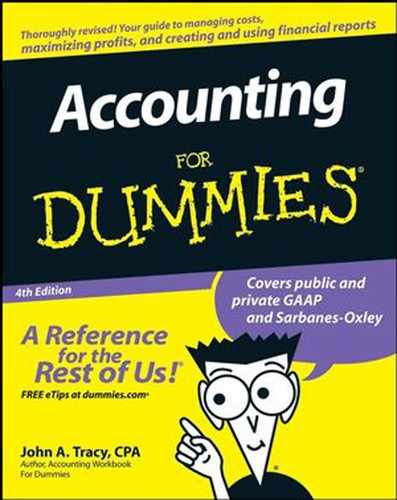10.2. Realizing That Not Everyone Budgets
Most of what I've said so far in this chapter can be likened to a commercial for budgeting — emphasizing the reasons for and advantages of budgeting by a business. So every business does budgeting, right? Nope. Smaller businesses generally do little or no budgeting — and even many larger businesses avoid budgeting, at least in a formal and comprehensive manner. The reasons are many, and mostly practical in nature.
10.2.1. Avoiding budgeting
Some businesses are in relatively mature stages of their life cycle or operate in a mature and stable industry. These companies do not have to plan for any major changes or discontinuities. Next year will be a great deal like last year. The benefits of going through a formal budgeting process do not seem worth the time and cost.
At the other extreme, a business may be in a very uncertain environment, where attempting to predict the future seems pointless. A business may lack the expertise and experience to prepare budgeted financial statements, and it may not be willing to pay the cost for a CPA or outside consultant to help.
But what if your business applies for a loan? The lender will demand to see a well-thought-out budget in your business plan, right? Not necessarily. I served on a local bank's board of directors for several years, and I reviewed many loan requests. Our bank did not expect a business to include a set of budgeted financial statements in the loan request package. Of course, we did demand to see the latest financial statements of the business. Very few of our smaller business clients prepared budgeted financial statements.
10.2.2. Relying on internal accounting reports
Although many businesses do not prepare budgets, they still establish fairly specific goals and performance objectives that serve as good benchmarks for management control. Every business — whether it does budgeting or not — should design internal accounting reports that provide the information managers need in running a business. Obviously, managers should keep close tabs on what's going on throughout the business. Some years ago, in one of my classes, I asked students for a short definition of management control. One student answered that management control means "watching everything." That's not bad.
|
10.2.2.1. Making reports useful for management control
Most business managers, in my experience, would tell you that the accounting reports they get are reasonably good for management control. Their accounting reports provide the detailed information they need for keeping a close watch on the 1,001 details of the business (or their particular sphere of responsibility in the business organization).
|
They contain too much information.
All the information is flat, as if each piece of information is equally relevant.
Managers are very busy people and have only so much time to read the accounting reports coming to them. Managers have a valid beef on this score, I think. Ideally, significant deviations and problems should be highlighted in the accounting reports they receive — but separating the important from the not-so-important is easier said than done.
10.2.2.2. Making reports useful for decision-making
If you were to ask a cross-section of business managers how useful their accounting reports are for making decisions, you would get a different answer than how good the accounting reports are for management control.
Business managers make many decisions affecting profit: setting sales prices, buying products, determining wages and salaries, hiring independent contractors, and purchasing fixed assets, for example. Managers should carefully analyze how their actions would impact profit before reaching final decisions. Managers need internal profit reports that are good profit models — that make clear the critical variables that affect profit (see Figure 10-1 in the next section for an example). Well-designed management profit reports are absolutely essential for helping managers make good decisions.
NOTE
Keep in mind that almost all business decisions involve nonfinancial and nonquantifiable factors that go beyond the information included in accounting reports. For example, the accounting department of a business can calculate the cost savings of a wage cut, or the elimination of overtime hours by employees, or a change in the retirement plan for employees — and the manager would certainly look at this data. But such decisions must consider many other factors, such as effects on employee morale and productivity, the possibility of the union going on strike, legal issues, and so on. In short, accounting reports provide only part of the information needed for business decisions, though an essential part for sure.
10.2.2.3. Making reports clear and straightforward
Needless to say, the internal accounting reports to managers should be clear and straightforward. The manner of presentation and means of communication should get the manager's attention, and a manager should not have to call the accounting department for explanations.
|
Many of the management accounting reports that I've seen could be improved — substantially! Accounting systems pay so much attention to the demands of preparing external financial statements and tax returns that managers' needs for good internal reports are often overlooked or ignored. The accounting reports in many businesses do not speak to the managers receiving them; the reports are too voluminous and technical and are not focused on the most urgent and important problems facing the managers. Designing good internal accounting reports for managers is a challenging task, to be sure. But every business should take a hard look at its internal management accounting reports and identify what should be improved.

